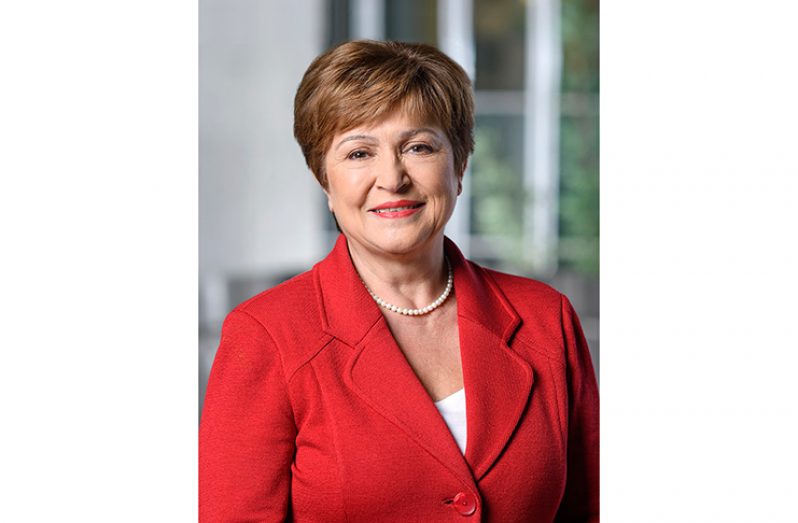…says COVID-19 impact could be worst global financial crisis
THE International Monetary Fund (IMF) has projected that the Coronavirus pandemic could be worse than the 2008 Global Financial Crisis as the expected negative global growth could push recovery into 2021.
The Global Financial Crisis in question was the biggest economic downturn since the Great Depression of the 1930s. World leaders are reassessing the outlook and extent of the negative possibilities of COVID-19 with over 100 countries now affected, over 300,000 with the virus globally and over 15,000 dead.
Following a conference call of G20 Finance Ministers and Central Bank Governors on Monday, IMF Managing Director, Kristalina Georgieva said that the human cost of the pandemic is “immeasurable”. “First, the outlook for global growth: for 2020 it is negative—a recession at least as bad as during the global financial crisis or worse. But we expect recovery in 2021. To get there, it is paramount to prioritize containment and strengthen health systems—everywhere. The economic impact is and will be severe, but the faster the virus stops, the quicker and stronger the recovery will be,” she said.
The extraordinary fiscal actions taken by many countries to boost health systems and protect affected workers and firms has been lauded by the IMF. Georgieva said that the body further welcomed the moves of major central banks to ease monetary policy.
Guyana’s Central Bank, the Bank of Guyana (BOG), has urged local financial institutions to offer relief to customers to counteract the economic and financial fallout of COVID-19 in the form of reduced interest rates on loans and credit cards; deferred loan payment, waived or reduced fees for banking transactions and reduced in-person transactions.
The Bank of Nova Scotia (Scotia Bank) and Guyana Telephone and Telegraph Company are among some already facilitating delayed bill payments. “These bold efforts are not only in the interest of each country, but of the global economy as a whole. Even more will be needed, especially on the fiscal front,” the IMF Managing Director said referring to measures taken globally.
She acknowledged that advanced economies are generally in a better position to respond to the crisis but emerging markets and low-income countries could face significant challenges.
Georgieva informed the public in her statement: “They are badly affected by outward capital flows, and domestic activity will be severely impacted as countries respond to the epidemic. Investors have already removed US$83 billion from emerging markets since the beginning of the crisis, the largest capital outflow ever recorded. We are particularly concerned about low-income countries in debt distress—an issue on which we are working closely with the World Bank.”
Local media reported just days ago that ExxonMobil halted its construction of its headquarters at Ogle while JetBlue’s launch in Guyana has been pushed to October.
Several other events planned by the entertainment industry have been curtailed while the ongoing 14-day ban on international travel to the country has also cut off possible investors.
As Guyana continues to ramp up efforts to safeguard against the virus, the government, through the Ministry of Finance, has requested US$5M from the World Bank under the Banks’ Rapid Response Facility.
If approved, the fund will boost efforts coordinated by the Ministry of Public Health and other ministries to contain the spread of COVID-19. The request is still being processed.
In the meanwhile, the government is also examining possible support from the Islamic Development Bank (ISDB) which is currently organizing a Rapid Response Fund.
When it comes to the IMF, Minister of Finance, Winston Jordan has stated that the government will not reach out to the body for funding, unless it is for a grant.
Nonetheless, for countries like Guyana which are IMF members, the IMF has made available a number of relief measures. One of which is the replenishing the Catastrophe Containment and Relief Trust to help the poorest countries. Georgieva said, on Monday, that the IMF stands ready to deploy all its US$1 trillion lending capacity and is stepping up emergency finance as nearly 80 countries have requested help.
The IMF Managing Director noted that several low- and middle-income countries have asked the IMF to make a Special Drawing Right (SDR) allocation as resorted to during the Global Financial Crisis. The option is still being discussed. In addition to international financing, there is also the option of accessing funds from the Natural Resources Fund (NRF), which is in the United States of America (USA)’s Federal Reserve Bank.
The IMF has also stated that it is working closely with the other international financial institutions to provide a strong coordinated response while concentrating bilateral and multilateral surveillance on the crisis and policy actions to temper its impact.
Meanwhile, major central banks have initiated bilateral swap lines with emerging market countries and the IMF has urged that as the global liquidity crunch takes hold, members are needed to provide additional swap lines. “These are extraordinary circumstances. Many countries are already taking unprecedented measures. We at the IMF, working with all our member countries, will do the same. Let us stand together through this emergency to support all people across the world,” Georgieva encouraged. “The human costs of the Coronavirus pandemic are already immeasurable and all countries need to work together to protect people and limit the economic damage.”



.jpg)








